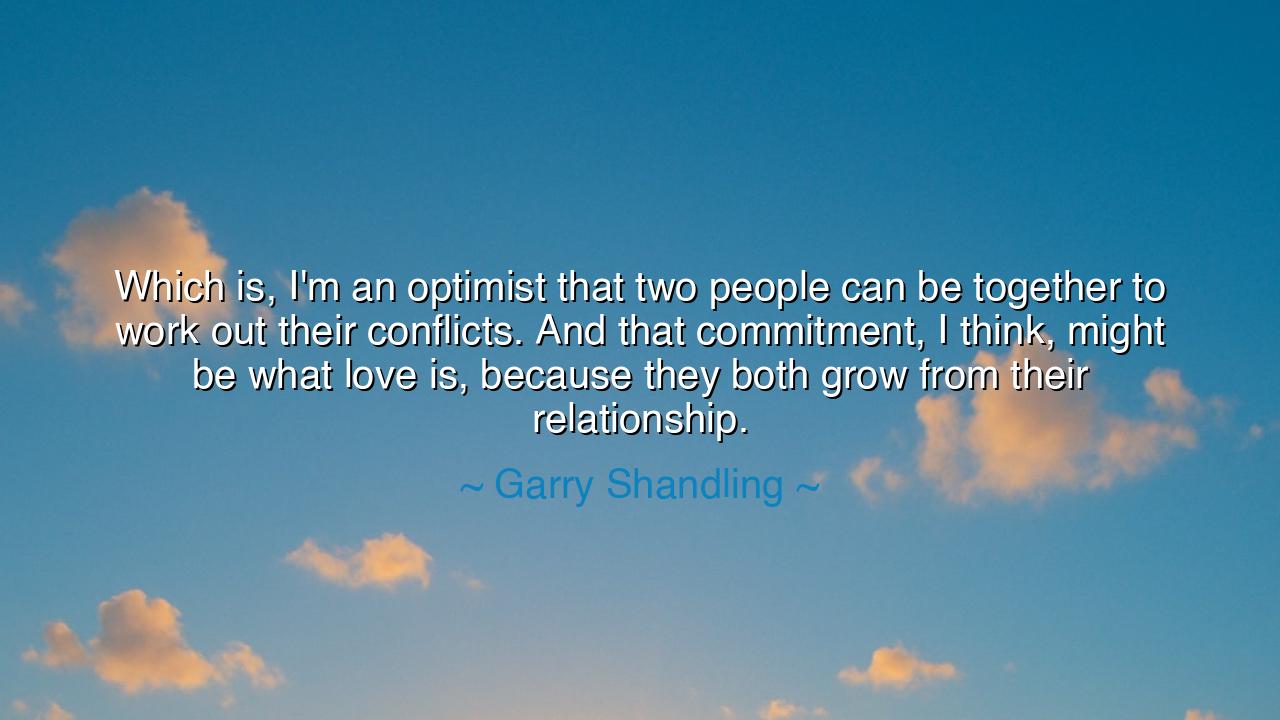
Which is, I'm an optimist that two people can be together to work
Which is, I'm an optimist that two people can be together to work out their conflicts. And that commitment, I think, might be what love is, because they both grow from their relationship.






“Which is, I'm an optimist that two people can be together to work out their conflicts. And that commitment, I think, might be what love is, because they both grow from their relationship.” Thus spoke Garry Shandling, a man known for his humor, yet whose laughter concealed profound reflections on the human heart. In this quiet confession, he reveals a truth not born of fleeting passion, but of enduring wisdom: that love is not the absence of conflict, but the commitment to face it together. True affection is not proven in peace, but in perseverance. It is not the fire that flares in the beginning, but the steady flame that continues to burn when the winds of life grow cold.
Shandling’s words rise from a life spent observing the fragility and resilience of relationships—on stage, in friendship, and in his own heart. In a world that often treats love as a fleeting indulgence, he stood as an optimist, believing that two imperfect souls could forge something lasting through understanding, forgiveness, and growth. His vision of love is not the dream of perpetual harmony, but the hope that even through storms, there remains a shared anchor—commitment. This, he says, “might be what love is,” for only those who stay, who listen, who forgive, and who change together truly know its meaning.
The ancients, too, understood this truth. Consider the tale of Odysseus and Penelope, whose love endured twenty years of separation and hardship. Odysseus faced monsters, temptations, and gods; Penelope endured loneliness, deceit, and the endless waiting of her heart. Yet when he returned, aged and scarred, she did not see a stranger but a soul bound to her through shared endurance. Their love was not born of ease—it was forged in trial. Through faith and patience, both grew in spirit, learning that commitment is not a chain but a covenant—a vow to remain when every reason to flee seems reasonable.
In every age, people have sought love as an escape from pain, imagining it as a constant joy. But Shandling’s wisdom reminds us that love is a discipline, not a distraction. Two hearts, bound together, will inevitably clash, for they are mirrors—each reflecting not only beauty but brokenness. The test is not whether they avoid this reflection, but whether they can behold it and still choose to stay. The conflicts, he says, are not failures; they are opportunities for growth. When two souls confront their differences honestly, they do not remain as they were—they evolve, drawing nearer to truth and to one another.
We see this echoed in the life of Nelson and Winnie Mandela, whose love endured years of separation under oppression and imprisonment. Their union was strained, yes, even broken in the end—but through their years of shared struggle, they embodied a greater form of love: one that seeks the good of the other, even when paths diverge. Their bond, though tested by the weight of history, taught the world that growth is the essence of love. Whether love endures or fades, it transforms those who live it sincerely.
Shandling’s quote also challenges the modern fear of vulnerability. Many seek comfort, not connection—harmony without honesty. Yet, he reminds us, love is not comfort alone; it is courage. It is the will to remain soft in a hard world, to believe that even amid disagreement, two hearts can still reach understanding. To be optimistic about love, as he was, is to believe in the redemption of the human heart—that through compassion and effort, we can become better than we were. Love, then, is not only an emotion; it is a practice of growth, a lifelong apprenticeship in humility.
So, my children of the heart, take this teaching to your lives: commitment is not a prison—it is a path. When conflicts arise, do not flee from them, but walk through them together. Speak truth, even when it trembles. Listen deeply, even when it hurts. Love not only when it is easy, but especially when it is hard. For it is in these moments of friction that souls are refined, and the purest form of love is born—the kind that grows, that heals, that endures.
In the end, Garry Shandling’s words are both a blessing and a challenge. To love is to work, to stay, to believe in the possibility of renewal. It is to say: We may not always agree, but we will not give up. This is the heroism of the heart—not grand, not loud, but quietly eternal. And those who live by it will find that love is not a fleeting flame, but the steady light that guides them home through every shadow.






AAdministratorAdministrator
Welcome, honored guests. Please leave a comment, we will respond soon